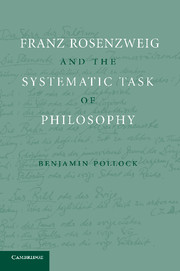Book contents
- Frontmatter
- Contents
- Acknowledgments
- Introduction: The Star of Redemption as “System of Philosophy”
- 1 System as Task of Philosophy: “The Oldest System-Program of German Idealism”
- 2 “A Twofold Relation to the Absolute”: The Genesis of Rosenzweig's Concept of System
- 3 Alls or Nothings: The Starting-Point of Rosenzweig's System
- 4 “The Genuine Notion of Revelation”: Relations, Reversals, and the Human Being in the Middle of the System
- 5 Seeing Stars: The Vision of the All and the Completion of the System
- Conclusion: The All and the Everyday
- Bibliography
- Index
4 - “The Genuine Notion of Revelation”: Relations, Reversals, and the Human Being in the Middle of the System
Published online by Cambridge University Press: 28 July 2009
- Frontmatter
- Contents
- Acknowledgments
- Introduction: The Star of Redemption as “System of Philosophy”
- 1 System as Task of Philosophy: “The Oldest System-Program of German Idealism”
- 2 “A Twofold Relation to the Absolute”: The Genesis of Rosenzweig's Concept of System
- 3 Alls or Nothings: The Starting-Point of Rosenzweig's System
- 4 “The Genuine Notion of Revelation”: Relations, Reversals, and the Human Being in the Middle of the System
- 5 Seeing Stars: The Vision of the All and the Completion of the System
- Conclusion: The All and the Everyday
- Bibliography
- Index
Summary
Out of the humble recognition of human finitude, The Star of Redemption boldly promises knowledge of the All. It is a bold promise indeed, one which Rosenzweig justifies, as we have seen, precisely on account of the Star's humble beginnings. In the fear of death that marks my awareness that I am not the Absolute, Rosenzweig has shown us, I experience the fundamental instability of my particular being; I experience my own hovering between my particular nothingness and my being. The philosopher who takes on the task of system “discovered” by German Idealism while rejecting the Absolute standpoint of German Idealism, who thus approaches the task of system as quintessentially human knowledge attainable from the standpoint of the human being in the middle of the All, thereby comes to recognize that particular beings are not to be grasped as manifestations of a single Absolute substance which generates itself out of an equally “one-and-universal Nothing.” Particular beings are not derivations of an original unity, but rather every particular generates itself out of its own particular nothing. By taking seriously the experience of particular nothingness made manifest in the fear of death, Rosenzweig aims to secure within his own system a grasp of that difference which he claims has been so frequently reduced to identity in the systems of German Idealism. In the beginning there was diff erence, not identity, Rosenzweig suggests, and this beginning in diff erence is what gives Rosenzweig “hope” he will attain the “true All.”
- Type
- Chapter
- Information
- Franz Rosenzweig and the Systematic Task of Philosophy , pp. 181 - 257Publisher: Cambridge University PressPrint publication year: 2009



